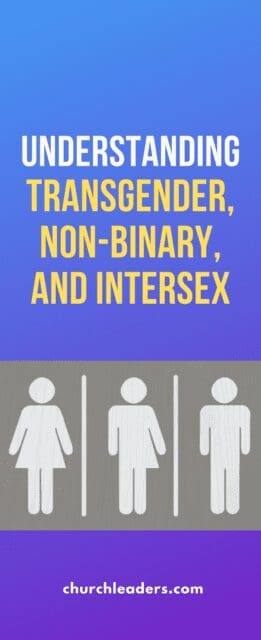Third, a biblical view of the human body suggests that biological sex is integral to human identity. The New Testament was written at a time when people held a negative view of the body. They prioritized the spirit or soul and devalued the body. I’d argue that this is common today as well, which is why we tend to prioritize our gender identity over our biological sex. But the biblical view of the body is different. We are embodied beings. Our bodies — including our biological sex — are integral to our personhood. That’s why Paul can write, “Or do you not know that your body is a temple of the Holy Spirit within you, whom you have from God? You are not your own, for you were bought with a price. So glorify God in your body.” (1 Corinthians 6:19-20). God’s design for us is wholeness — body and soul integrated together in worship to God. You are your body. You are not a soul trapped in a body; you are an embodied being.
Finally, it appears that sexual differences will be maintained after the resurrection. As Sam Storms says:
Men will remain anatomically and genitally male forever. Women will remain anatomically and genitally female forever. And both men and women will be aware of this not only in their own bodies but also in the other. It would be a grotesque and unbiblical reversal of God’s original creative design if the redeemed in heaven lived as genderless beings.
So we can conclude, as Preston Sprinkle says:
Based on my reading of Scripture thus far, it appears that God intends for humans to identify as male and female, and that one’s sexed body is an essential part of this identity. It also appears that there are no other sex or gender identities mentioned in Scripture other than male or female … and I do not see any evidence in Scripture (or in a biblical worldview of human nature) that male and female identities can be discerned without reference to the body. The sexed body itself is essential to personhood and an integral means though which we reflect God’s image, both in our pre-fall state and in our future resurrected existence. Scripture does not seem to allow for—and in a few places explicitly prohibits—identifying as a sex or gender that’s different from your biological sex.
Can someone be a different gender than their biological sex?
In the first week of this series I said that we are all sexually broken, and yet we serve a God who’s eager to forgive and repair our broken sexuality. We believe that the Fall affected every part of our world, including our sexuality. So if you ask me if we can experience a disconnect between our feelings about our gender identity and our biological sex, the answer is absolutely yes. We can experience feelings like this.
This doesn’t mean that we can in an ontological sense our gender identity can be different from our biological sex. The Bible links our gender identity and biological sex together.
This really opens a larger discussion about gender, which we’re going to talk about in a few weeks. It’s an important discussion, because sometimes we can feel different from what our culture says a particular gender should look like.
It also opens up an important discussion about our bodies and our spirits. God created us as embodied creatures, so our bodies matter. This has huge implications for so many areas in our lives. We are embodied. Our bodies matter. God’s desire for all of us is greater integration of body and soul, so that we are whole beings, rightly oriented to God.
Again, Preston Sprinkle puts it best:
The Bible itself doesn’t separate sex from gender. That is, it uses “male” and “female” to cover both aspects (biological and cultural/psychological) of the human experience … In short, I suggest that the Bible recognizes two sexes and yet provides a good deal of flexibility in what it means to experience and express your male or female identity.
Can someone be a different gender than their biological sex? The answer is: we can feel like it, but Scripture links our biological sex and gender identity and says that we are sexually embodied creatures — but that there is some flexibility in how we express our gender identities.
What about intersex people?
In most cases of intersex people, it’s possible to determine biological sex. But there is 1% who are ambiguous. I find what Preston Sprinkle says to be helpful:
I find it more helpful to say that such persons—beautiful persons created in God’s image and are worthy of respect, value, and admiration—are a blend of the two biological sexes rather than a third sex completely different from male or female … Theologically, it makes sense to say that through the Fall, some people are born with a blend of male and female sex characteristics. If we believe that the Fall has the potential to touch every aspect of human nature, then what would it look like for the Fall to touch our sexual anatomy or sex chromosomes? I suggest that it would look like intersex conditions.


